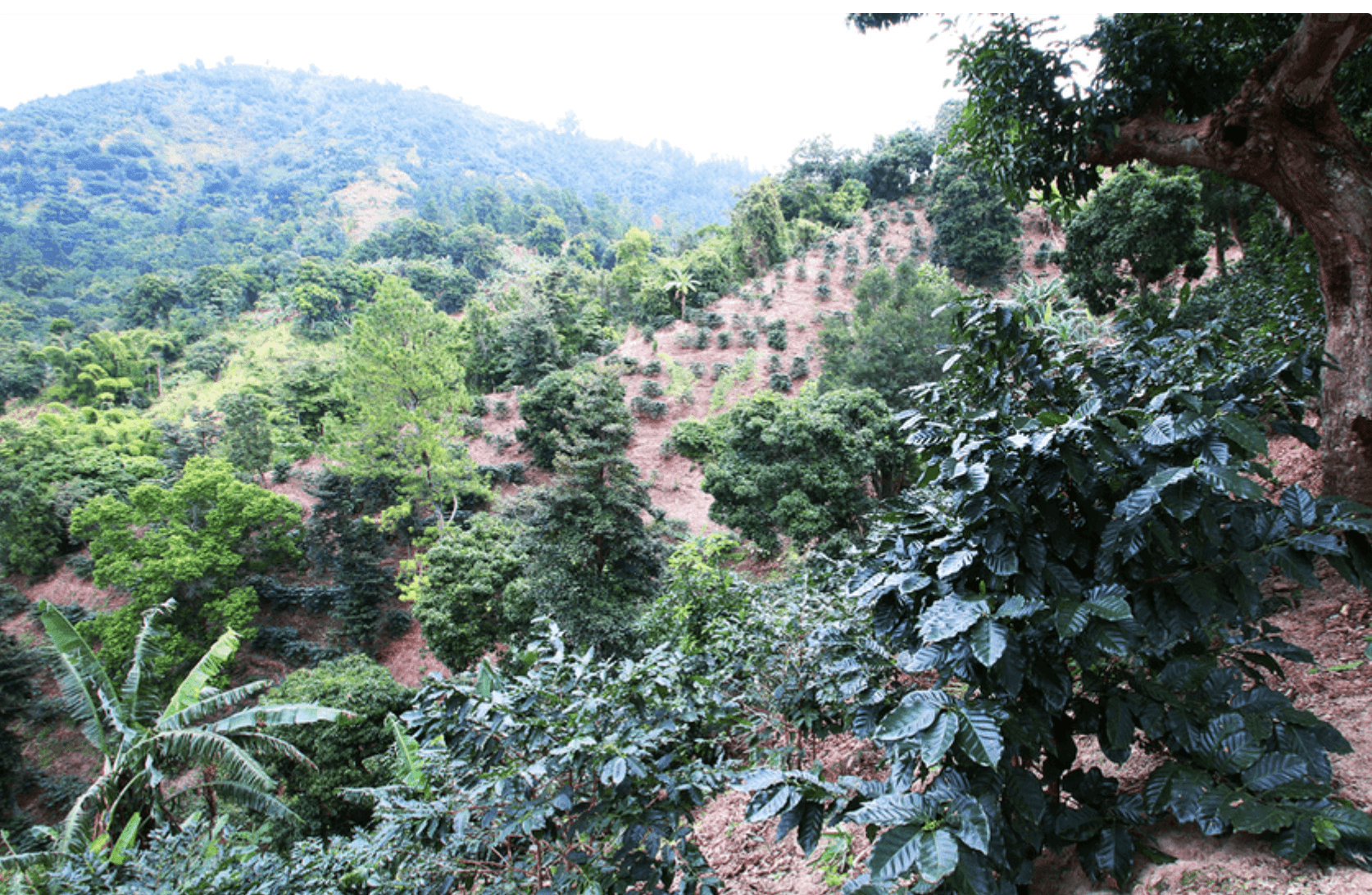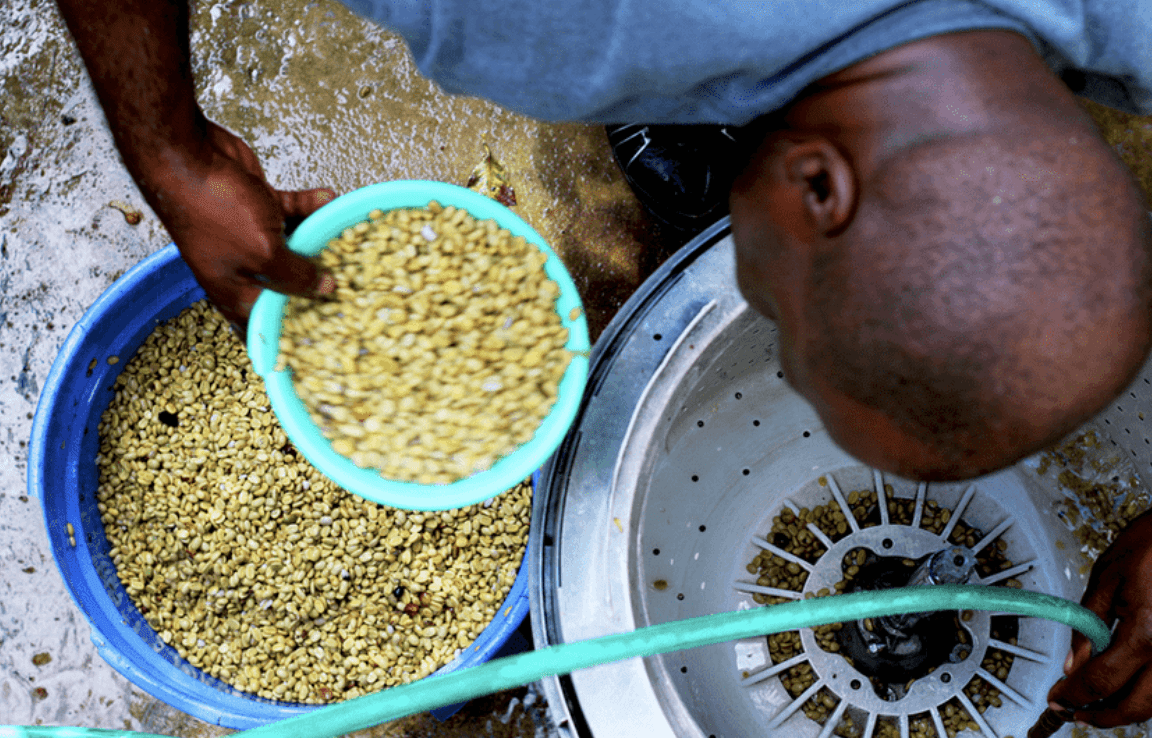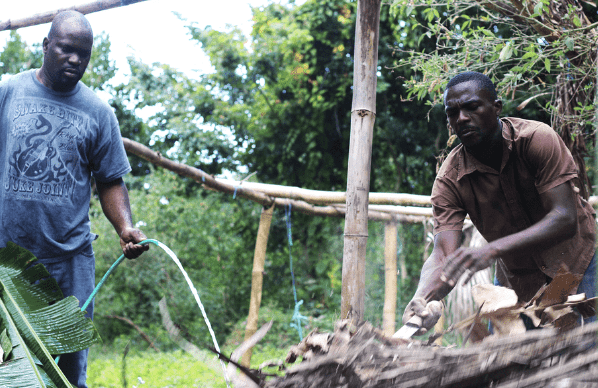But Sustainable Outgrowing Is Renewing the Industry For Family Farms
Small family farms are the backbone of the Jamaican coffee industry. Generational stewards of this sought after crop, their expertise and dedication is responsible for Blue Mountain coffee’s persisting reputation as the world’s best.
Yet, Jamaican coffee farmers are struggling—and they have been for some time. Despite the fact small family estates encompass nearly all of Blue Mountain coffee production, Jamaican Blue Mountain coffee farmers have been denied a fair stake in the market time and time again.
A traditional reliance on low-paying coffee processing companies have left most small farms vulnerable, and as an outcome, many have documented low coffee yields. This vulnerability has exposed farmers to recurring social and environmental stresses, and low resource endowments for small farmers have affected the political economy, market relations, coffee policies and institutional resources available in Jamaica.
The good news is that the landscape of Jamaican coffee is changing—even as certified Blue Mountain beans continue to command the respect and desire of luxury coffee drinkers around the world.
With the entrance of well-paying and integrated commercial producers and processors like Blue Mountain Estates Coffee Corporation, historic reliances on dominant processors are lessening, small farmers are beginning to reap the benefits of their product’s enormous profitability, and sustainable, equitable outgrower networks are renewing the industry for family farms.
What challenges face small family farms in the Blue Mountains?
By any metric, smallholder farms make up the vast majority of Blue Mountain coffee estates in Jamaica. Of over 8,200 small family farms on the island, 6,000 of them reside in the Blue Mountains—a designated area not much larger than 14,000 acres itself.
Yet—as is the case with many exclusive coffee regions throughout history—small farmers have the least amount of power in the Blue Mountain market. Most of all, they have limited control over their relationship to the bean’s incredible value.
Because most small farmers do not have the capability or equipment to process their coffee—or the logistical means to sell that processed coffee to roasters and buyers across the globe—nearly all small farmers in Jamaica rely on dominant island processing companies to buy their beans and float Blue Mountain coffee to the global industry. Many of these processors buy coffee cherries from small farmers in informal and inconsistent purchase agreements, often at incredibly low prices. And because most small farmers are not able to access the end-market, their ability to turn any profit is susceptible to shocks from processors, who can lower prices dramatically, decrease supply demands or uproot relationships with enormous consequences to smallholder estates.
Expectedly, this system of inadequate investment has perpetuated a host of challenges for family farms.
A 2020 study, for example, found that only 3% of independent coffee farms in Jamaica received technical help from extension services, government programs, regulatory agencies or processing partners in recent years. Additionally, more than half the farmers said they hadn’t participated in any form of informational group activities, like farmer-led training sessions.
The study also found that, despite limited resources, farmers relied heavily on their own capacities to deal with major challenges: 98% of farmers surveyed said that they had to cope with recent droughts, fungus and price shocks on their own, applying fewer inputs, drawing down their savings or selling assets to manage finances. Such a dependency on self reliance, the study concluded, is reflective of a broader and inequitable outgrower system that offers limited support and, in turn, restricts the market’s viability at large.
Most revealing, the study found that over 62% of farmers had not applied fungicides in recent years, despite 61% of farms reporting some coffee losses as a result of harmful fungus. Many had not applied fungicides due to a lack of resources and appropriate equipment, the researchers reported. Of those who did apply fungicides, only 15% owned a mechanical sprayer—an inexpensive and otherwise standard piece of equipment which, through common sense arrangements, a commercial producer like Blue Mountain Estates Coffee Corporation could work to supply our outgrowers.

Small family farms are the backbone of the Jamaican coffee industry. Generational stewards of this sought after crop, their expertise and dedication is responsible for Blue Mountain coffee’s persisting reputation as the world’s best.
Yet, Jamaican coffee farmers are struggling—and they have been for some time. Despite the fact small family estates encompass nearly all of Blue Mountain coffee production, Jamaican Blue Mountain coffee farmers have been denied a fair stake in the market time and time again.
A traditional reliance on low-paying coffee processing companies have left most small farms vulnerable, and as an outcome, many have documented low coffee yields. This vulnerability has exposed farmers to recurring social and environmental stresses, and low resource endowments for small farmers have affected the political economy, market relations, coffee policies and institutional resources available in Jamaica.
The good news is that the landscape of Jamaican coffee is changing—even as certified Blue Mountain beans continue to command the respect and desire of luxury coffee drinkers around the world.
With the entrance of well-paying and integrated commercial producers and processors like Blue Mountain Estates Coffee Corporation historic reliances on dominant processors are lessening, small farmers are beginning to reap the benefits of their product’s enormous profitability, and sustainable, equitable outgrower networks are renewing the industry for family farms.
What challenges face small family farms in the Blue Mountains?
By any metric, smallholder farms make up the vast majority of Blue Mountain coffee estates in Jamaica. Of over 8,200 small family farms on the island, 6,000 of them reside in the Blue Mountains—a designated area not much larger than 14,000 acres itself.
Yet—as is the case with many exclusive coffee regions throughout history—small farmers have the least amount of power in the Blue Mountain market. Most of all, they have limited control over their relationship to the bean’s incredible value.
Because most small farmers do not have the capability or equipment to process their coffee—or the logistical means to sell that processed coffee to roasters and buyers across the globe—nearly all small farmers in Jamaica rely on dominant island processing companies to buy their beans and float Blue Mountain coffee to the global industry. Many of these processors buy coffee cherries from small farmers in informal and inconsistent purchase agreements, often at incredibly low prices. And because most small farmers are not able to access the end-market, their ability to turn any profit is susceptible to shocks from processors, who can lower prices dramatically, decrease supply demands or uproot relationships with enormous consequences to smallholder estates.
Expectedly, this system of inadequate investment has perpetuated a host of challenges for family farms.
A 2020 study, for example, found that only 3% of independent coffee farms in Jamaica received technical help from extension services, government programs, regulatory agencies or processing partners in recent years. Additionally, more than half the farmers said they hadn’t participated in any form of informational group activities, like farmer-led training sessions.
The study also found that, despite limited resources, farmers relied heavily on their own capacities to deal with major challenges: 98% of farmers surveyed said that they had to cope with recent droughts, fungus and price shocks on their own, applying fewer inputs, drawing down their savings or selling assets to manage finances. Such a dependency on self reliance, the study concluded, is reflective of a broader and inequitable outgrower system that offers limited support and, in turn, restricts the market’s viability at large.
Most revealing, the study found that over 62% of farmers had not applied fungicides in recent years, despite 61% of farms reporting some coffee losses as a result of harmful fungus. Many had not applied fungicides due to a lack of resources and appropriate equipment, the researchers reported. Of those who did apply fungicides, only 15% owned a mechanical sprayer—an inexpensive and otherwise standard piece of equipment which, through common sense arrangements, a commercial producer like Blue Mountain Estaes Coffee Company could work to supply our outgrowers.

Establishing a vibrant network of farms to source coffee beans—a system called outgrowing—is key to our work in the Blue Mountains: While we produce and cultivate Blue Mountain coffee on 550 acres of our own, we also source unprocessed coffee from hundreds of community partners.
This means that Blue Mountain Estates Coffee Corporation is able to make a significant impact on the entire coffee industry in Jamaica—and through fair farmgate prices, practical extension services and meaningful advancements to increase production, we’re dedicated to using our influence to alleviate many of the challenges facing our community partners.
Routinely seeking prices that leave little room for farmer profits, major coffee processors in Jamaica paid an average price of $22 per box of unprocessed coffee to outgrowers in 2018. At the outset, Blue Mountain Best’s goal is to nearly double that number, paying our community partners at least $40 per box while sourcing over 40,000 units per year from approximately 500 smallholder farms.
At the same time, we work to offer meaningful extension services to our network of partner farms, like practical solutions to apply proper agronomic methods to their acreage and increase production.
Most Blue Mountain farmers have not reinstalled new equipment since they began farming, and many haven’t increased their productivity in decades. With fair farmgate prices, extension officers and common sense agreements, Blue Mountain Best is able to work with small farms to purchase new equipment—like mechanical sprayers—or offer technical help to increase the health and production of their crop.
Extension services can take other forms, too. Because many small farms do not have the capabilities to properly apply for key government programs and initiatives— like those that help fund fertilizer purchases or provide assets to improve irrigation—we can help our farmers to assemble applications and secure these necessary funds.
In the end, these efforts will decrease our community partners’ susceptibility to weather events like severe storms, increase their production, and—importantly—better guarantee our own additional supply of coffee for our customers. In short, we’ll help to improve the Blue Mountain agricultural community’s staying power and long term viability.
Over time, our investment means we can pay higher rates to our outgrowers, and—central to our values as a company—the inequitable gap between export value and farmgate prices will close.
If you’d like to learn more about our work in the Blue Mountains, or if you’re interested in partnering with Blue Mountain Estates Coffee Corporation as an investor or coffee company, reach out to our team.

Share the Post:



